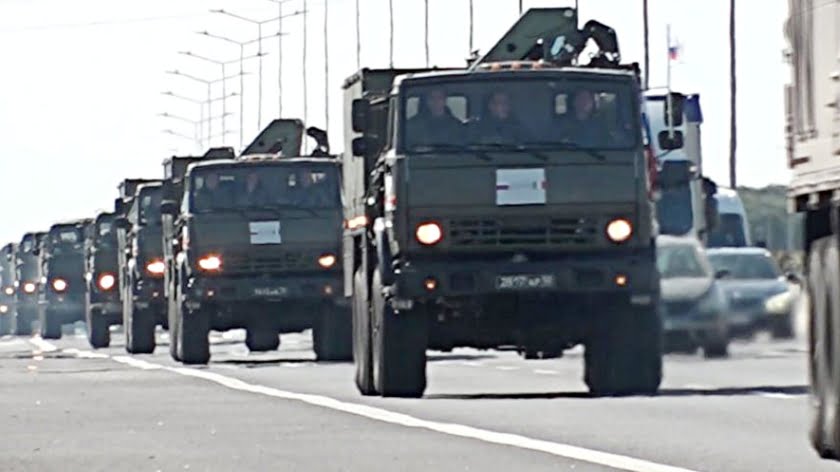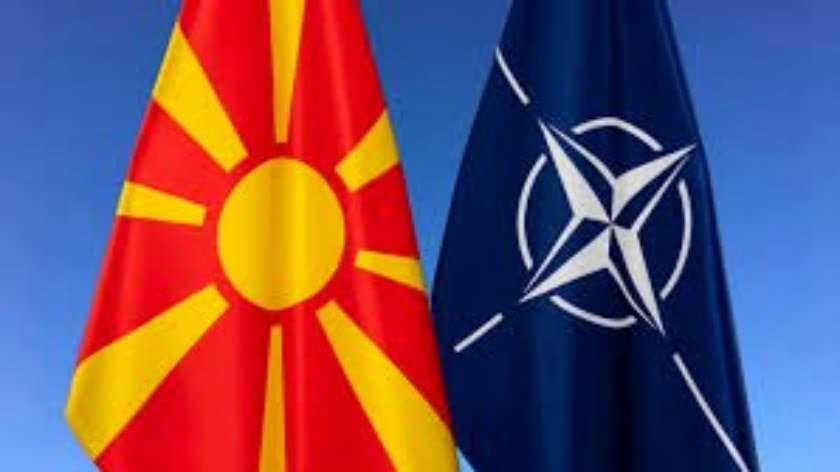Bad Sociology: Biden’s Vaccine Purge Prepares for Domestic Counter-Insurgency
American culture has been artificially shifted in the most radical way, not seen since the introduction of mandatory public schooling a century ago.
The mandatory Covid vaccination policy in the U.S. army is an extension of Biden’s ideological purging program, but the logic behind it is not thoroughly understood by the public.
Conservatives see a likely decrease in morale and enlistment, while liberals see an opposite likely outcome. But enlistment in a volunteer army may not be the end-goal, and so we must interpret the moves in light of the growing potential of a blanket draft.
Superficially, the premise for the purge is the equating of vaccine hesitancy with so-called ‘Trumpism’, which in turn is ‘linked’ to right-wing extremism such as white nationalism – a logical fallacy. Because the logical fallacy is so clear, and the purge of norm-centric political views is the goal, it gives rise to all kinds of questions and theories.
Military officials would absolutely know that this is a false equivalence, as the recent Pew Research poll on vaccine hesitancy shows that roughly 40% of Americans do not want the jab. Certainly 40% of Americans are not white nationalists. Because this data is readily accessible, and really because claims to the contrary are heuristically absurd prima facie, it effectively fuels any number of questions about the patriotism and intentions of the brass:
“Why would top brass stand by while the false equivalence is used as a pretext for an ideological purge of America’s most patriotic and pro-constitution elements?”
But there’s a further problem in this conflation of anti-vax and far-right. This vaccine hesitant view also has a high correlation with African-American enlistees who may be aware of the history of the U.S. government experimenting on this demographic, which also reflects an overall distrust in governmental institutions within various African-American communities.
And this is compounded by a view in the populist right, that the problem with vaccine safety means there is a design to weaken the military. Then there is the government’s heavy-handed and politicized response to the Covid pandemic, including the publicized concentration camps for quarantining.

Through understanding military sociology alongside the real challenges that the U.S. faces, both internally and geopolitically, we can trace future plans of the American elites.
While the brass have become convinced that a ‘Woke Army’ will be well-situated to suppress constitutionalist and anti-reset citizens in an insurgency, the same woke policies aim to improve resilience against Chinese propaganda in a conflict scenario. Eliminating anti-Covid vax soldiers is quietly equated to eliminating soldiers who will also refuse other orders likely to result in death or serious injury.
There are invisible costs to this proposition. Enlistment may take a hit, but there will be even more pushback if there is a full-scale military conflict which requires a draft. The hedge against this is to increase wokeness, as counter-intuitive as this seems for many.
What we are seeing is how the military is doing sociology in the present year, which may be quite wrong. The whole premise of the purge is only as useful as the sociology is accurate. Typically, good military sociology – results-driven – accurately gauges the public’s attitude in order to translate that into sound military policy and training. That’s how the ‘Don’t Ask, Don’t Tell’ policy was arrived at. It matched Main Street’s attitude in the 1990’s.
The U.S. military does not openly track the party affiliation or belief-systems of its enlisted members, and unscientific voluntary polls by publications like ‘Military Times’ tend more to reflect the views of its regular readers (conservative) than the actual population of enlisted on the whole. Of course, there are career enlisted, and those who just perform four years active duty and two years inactive IRR in their minimum MSO. Career enlisted probably tend to be more conservative than general enlisted numbers would indicate. But it would be an error to think that such tracking did not take place within the institution, but more, such analysis has been carried out by notable military sociologists.
But because of the ideological purge in academia over the last fifteen years, which hit the social sciences first and hardest, there has been a dangerous and growing principles-driven approach.
This principles-driven approach – ‘woke because we should be woke’ – is at odds with the realist and functionalist schools in state-sanctioned sociology which orient towards making policy on the pragmatic basis of results.
Marxian tools in sociology have proved invaluable over the past century, when they are utilized in harmony with Durkheim’s functionalist theory. C. Wright Mills, who wrote extensively on Marx, also informs the framework of military sociology. But the Marxist school by itself is rooted in conflict theory, where the principle of conflict (the class struggle) is central to society.

Naturally, the wokeness campaign is being couched in the language of pragmatism, – ‘woke because this is smarter’ – because this is still the attitude of the brass. In brief, the brass is being misled by academia, which in turn is unfit for purpose.
The weaponization of conflict theory towards the perceived pragmatic aims of the state, as the population is ruled through division, carries a high-risk of misapplication when the present body of literature is dominated by actual conflict theorists. This can lead to a bigger disaster if the aim is to prepare for a draft.
A key factor to understand, again, is the increasing push to normalize the draft. As Max Margulies of West Point writes on this military sociology question:
“One common belief is that maintaining draft registration bolsters the link between civilians and soldiers, which has weakened significantly since the U.S. military became an all-volunteer force. Through the last two decades of war, only 1 percent of Americans have served in the military.
Some experts suggest that such a weak civilian-military connection contributes to a number of problems, including a lack of familiarity with the military, a military that is not representative of society and an unfair distribution of the human costs of war.”
Rather than aiming to defang the military, a transformation of military ideology is underway that is believed to a.) better prepare it for future conflicts abroad, b.) attract more recruits from minority groups (or make a future draft more palatable), and c.) prepare the force for use against American citizens identifying as constitutionalist, conservative, etc.
Point ‘c.)’ is probably the most disconcerting. The old-left with its ties to both the Soviet Union and organized labor had been traditionally considered the likely source of domestic counter-insurgency crises. Hence, committed anti-communist conservatives were drawn into the volunteer military, especially true for pipe-hitters in the special forces. This was part of a relatively clear world-view: communism is the enemy at home and abroad.
A social shift occurred with the collapse of the USSR, in combination with the insertion of Frankfurt School theories and the successful co-option of left-radicalism by the Soros associated non-profit industrial complex. The outsourcing of industrial jobs to developing countries was also part of this change of left-radicalism, from labor-industrial unionism into the loftier and deeply abstracted halls of academia.
Now with social media, as part of the intelligence services, there is an ability to entirely control radical left-movements. Twitter’s Jack Dorsey, for example, is effectively the ‘Minister of Information’ for Antifa and BLM. There was a pragmatic rationale behind American elites push for progressivism as the unofficial ideology of the state. This is because American conservatism, with its roots in classical liberalism, favors decentralization, while progressivist socialism generally favors the centralization of state authority.
In our analysis “Biden’s Pro-Terrorism Policy & Ideological Purging Is a Dangerous Combination That Strains Social and Military Support”, we emphasized that “America’s deep state and oligarchy have landed upon a type of civilizational about-face, where the legitimating social ideology is increasingly being made into the legitimating ideology of the military.”
This much is to be expected, however, since the median views among the ranks of the enlisted including NCOs ought to generally reflect those of society. It is a greatly related matter, though, that the NGO industrial complex in the U.S. has promoted this ideological shift among the civilian population.
In other words, American culture has been artificially shifted in the most radical way, not seen since the introduction of mandatory public schooling a century ago.
But the changes being implemented in the military come at a high cost, because they strain support from historically pro-military and conservative segments of the population. This may lend towards the creation of a counter-insurgency crisis as much as they are believed to be in place as a counter-measure.
In strategic planning for future conflicts in light of 4th Generation Warfare (4GW) where a Baudrillardian simulacrum is constructed, there is an ostensible benefit side to this high cost in the equation.
This relates both to morale, unit cohesion, but also the motivations of individual soldiers in America’s future conflicts – likely in Latin America and also against China across numerous possible theaters. A conflict with Russia is also a potential conflict included in the thinking behind the ideological shift in the military
The thinking here is in part that soldiers indoctrinated into a culturally left outlook (or at least a left ‘dictionary’) will be better prepared in occupation and subsequent counter-insurgency operations at home and abroad, but also better inoculated against foreign/enemy propaganda aimed at the enlisted which increases perceived racial inequities in American society.
If the conflict is with Russia, then the thinking here is that since Russia is painted as an ultra-conservative state in liberal western media, then a ‘woke’ U.S. military might find similar inspiration as American soldiers in WWII.
Another part of the thinking as Margulies would likely affirm, is that this type of ‘woke’ sensitivity training among NCOs in the field may influence a change in banter and even decision making on operation assignments, so that soldiers of color do not believe opportunities and risks are assigned on the basis of race.
Historically, America’s opponents have weaponised social contradictions in the U.S. along the lines of race, which is in part attributed to the morale crash in the Vietnam War.
So-called Vietnam syndrome was warned about by Northwestern University sociologist Charles Moskos, architect of the ‘Don’t Ask Don’t Tell’ policy. Moskos, a veteran himself, dedicated his career to the study of the U.S. military as a social institution, and his analysis and the methods he developed continue to form the basis of military policy.
A 2018 Blue Star Families Military Lifestyle Survey results showed that military felt both disconnected from their communities and from the military itself:
“Forty-eight percent of respondents reported not feeling a sense of belonging to their civilian community, and 43 percent felt the same about their military community. This finding was critical because “a lower sense of belonging to a community has been linked with both depression and suicide.”
The blatant politicization of once-respected research institutions like MIT has increased a growing distrust in institutions. And this feeds right into vaccine hesitancy – not only among conservative soldiers, but also black American soldiers, overlap here aside. But it is also true for those on the other end of the spectrum who exhibit trait openness, and are accustomed to critically challenging mandates from authorities.
The tone-deaf approach of the brass under the Biden administration on vaccines has worked against the desired result. At the end of the day, the military can mandate the vaccine. But what happens when these become bi-annual, tri-annual? Quarterly? Monthly? What happens if we move from adverse reactions to long-term chronic impairment and illness?
The present rate of vaccination for Covid among the enlisted is reportedly about the same as in the general population – just under 60%. But the costs against morale and cohesion may be much higher.
In concluding our thoughts, it will be a surprise to many conservative citizens that there are ostensibly strategic reasons for the introduction of elements of Critical Race Theory and ‘revisionist’ American history into the training of commissioned officers and enlisted of the U.S. military.
It is especially important to understand the rationale behind this sea-change underway, as they are sociological in nature, but to do so requires letting go of certain assumptions and beliefs. This is because conservative thinking is also principles-driven, and can lose sight of results. Instead our thinking must be carried out in terms of realism and pragmatism.
The U.S. military today is insufficient for a full-scale conflict, let alone a total war with Russia or China. If both are allied, there is a close to zero chance of victory. The idea of reinstating the draft has been bandied about for some time, but it is a view that has grown in popularity.
The morale disaster in Vietnam, with its drafted army, was a strong indicator that the vulnerabilities and inequities in American society on the basis of race would prove to be an Achilles’ heel. Vietnamese propaganda was highly effective in creating an illusion that a disproportionate number (relative to population) of black draftees were killed in action. The propaganda also buttressed already persistent views that the war they were fighting was on the side of those who were oppressing them at home.
While Moskos believed that that the successes of the Civil Rights movement were in part predicated on the desegregation of the military under Truman in 1948, this was still based in a functionalist sociology: Americans were ready for desegregation before Truman’s policy.
Biden’s advisors have turned sociology on its head, changing it from ‘what works’ to ‘what ought to be’. Moskos would not approve.
From CRT ideological tests to vaccine-refusal purges, the toll on the military will be high. While this much is understood, the real value and efficacy of the benefits of these new policies may be similar to those of the vaccine itself.
Part of the thinking is that a ‘woke’ indoctrinated army will be more ready to put down a civilian insurrection, now identified with the far-right as opposed to the historical left. But rather than trying to ideologically train the army for domestic counter-insurgency, the aim should be to be to end the policies that give rise to them.
Rather than trying to fulfill some absurd mandate to ideologically prepare our soldiers for an unwinnable total war with two nuclear powers, managing multipolarity and spheres of influence should be the goal at the foundation of military doctrine.







